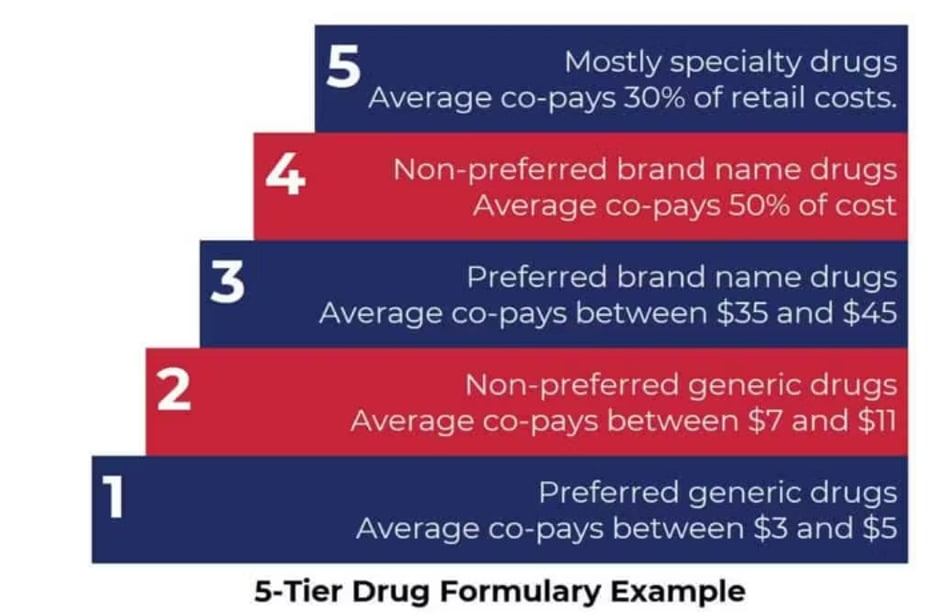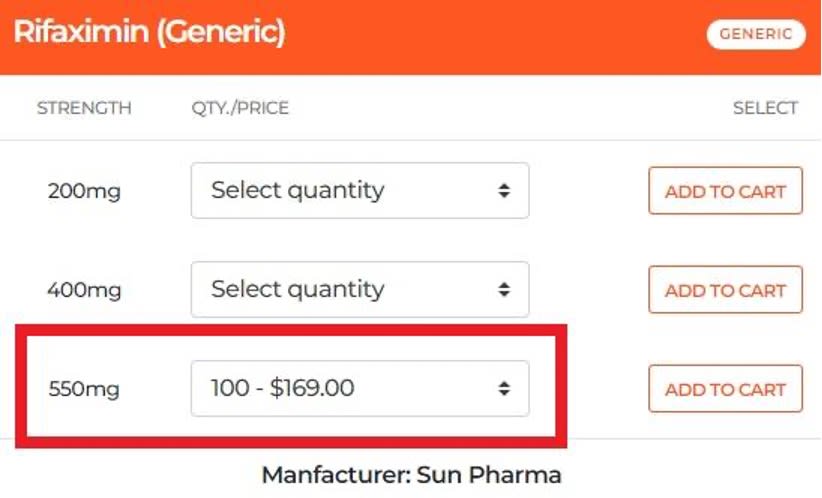Table of Contents
II. Why is Xifaxan Not Covered By Insurance?
III. Canadian Pharmacies: An Affordable Alternative
Xifaxan (generic name rifaximin), is an antibiotic prescribed to treat conditions such as irritable bowel syndrome with diarrhea (IBS-D), traveler’s diarrhea, and hepatic encephalopathy (HE). Its targeted action within the GI tract helps manage symptoms without the wider effects typical of other medications prescribed for these conditions. The challenge and question for many is: Why is Xifaxan not covered by insurance?
There’s no doubt that Xifaxan is an effective treatment for both IBS-D and HE, but without insurance, its cost can be prohibitive for individuals who need it. Variability in coverage levels and requirements leaves many confused as they navigate insurance complexities and look for affordable alternatives.
In this guide, we’ll map out the reasons why Xifaxan is not covered by insurance in many cases, how it is covered by the largest insurance providers in the U.S. and other affordable alternatives.
Quick Takeaways:
- Xifaxan is a targeted antibiotic for IBS-D, and HE is preferred for its targeted action in the GI tract.
- Insurance coverage for Xifaxan varies, often due to its high cost and patented status, leading to formulary exclusions.
- Step therapy and prior authorization can further delay access to Xifaxan, despite its effectiveness.
- Canadian pharmacies like My Drug Center offer affordable alternatives to U.S. prices for Xifaxan, including generic versions.
- Safety and compliance are ensured through strict regulations by Health Canada and CIPA for Canadian pharmacies.
Xifaxan: A Quick Overview
Xifaxan, or rifaximin, stands out because of its localized action in the gastrointestinal tract. There, it targets and neutralizes bacteria responsible for exacerbating these conditions. This localized effect is a significant departure from the mechanism of older antibiotics, which circulate in the bloodstream and can affect the body’s overall microbial balance.
The drug's minimal systemic absorption is a key advantage, allowing it to effectively treat IBS-D and HE symptoms without the common side effects often associated with broader-spectrum antibiotics. For patients with IBS-D or travelers’ diarrhea, Xifaxan helps reduce episodes of diarrhea, and in HE patients, it reduces the recurrence of hepatic encephalopathy episodes by controlling the production of ammonia-producing gut bacteria.

Xifaxan's approval by the FDA for these indications is a testament to its effectiveness and safety profile. This endorsement not only confirms Xifaxan as a critical component in managing IBS-D and HE but also emphasizes its role in improving the quality of life for individuals suffering from these challenging conditions.
Why is Xifaxan Not Covered By Insurance?
It’s important to note that Xifaxan is covered by many insurance providers, including commercial providers, Medicare Part D, and Medicaid.
The challenge is that coverage varies by plan due to the medication’s high cost. This expense is partly attributed to the drug's patented status, which prevents the availability of more affordable generic alternatives on the market. As a result, insurance companies may hesitate to cover Xifaxan, prioritizing cost-effectiveness in their coverage policies.
Formulary exclusions further complicate access to Xifaxan. Insurance providers use formularies—a list of medications they cover—to manage costs. Due to its high price, Xifaxan may be excluded in favor of less expensive alternatives, leaving patients without coverage for this specific treatment. This is a common cost-saving measure that directly impacts patients' ability to obtain necessary medications.
When it is included on formularies, it’s often at level 5, which can cost patients up to 30% of the retail cost of their medication. [2] For Xifaxan, that cost is up to a staggering $700 when you account for market prices above $2300. [3]

Step therapy requirements add another layer of complexity. This policy mandates that patients first attempt treatment with other, typically cheaper, medications and demonstrate that these alternatives are ineffective before coverage for Xifaxan is approved. This process can delay access to essential treatment, exacerbating patients' conditions and potentially leading to increased healthcare costs in the long run.
Prior authorization processes also play a significant role in why Xifaxan is often not covered by insurance. These procedures require healthcare providers to obtain approval from insurance companies before the medication can be covered, a step that can significantly delay treatment. Documentation and justification requirements can be a cumbersome hurdle for both patients and healthcare providers.
Finally, the variability of coverage across different plans, including commercial insurance, Medicare, and Medicaid, means that access to Xifaxan can significantly differ from one patient to another. This inconsistency can lead to confusion and inequity in treatment access, with some patients able to receive Xifaxan through their insurance while others face high out-of-pocket costs.
Together, these factors create a complex web of barriers that prevent many patients from accessing Xifaxan through their insurance, despite its proven effectiveness in treating IBS-D and HE.
Canadian Pharmacies: An Affordable Alternative
For those grappling with the high cost of Xifaxan, especially individuals without insurance or whose plans do not cover the medication, Canadian pharmacies present a practical solution. My Drug Center and other Canadian pharmacies offer an accessible pathway to obtain Xifaxan at a fraction of the drug prices in the U.S.
There are several reasons for this. First, the Canadian healthcare system doesn’t have the extensive patent laws the U.S. does, meaning affordable generic alternatives for medications like Xifaxan are more available to patients who need them.
For example, we know customers at U.S. pharmacies with insurance pay up to $700 for Xifaxan. At My Drug Center, the generic version is just $169.

Because these generic versions are FDA-approved for safety, it’s both safe and legal to import them from Canada to the U.S.
In addition, the Canadian government regulates drug prices much more closely and systematically, leaving less room for retailers, insurance providers, and competitive market dynamics to drive up prices for consumers.
Combined, these factors often make Canadian drugs more affordable than their U.S. counterparts even when insurance does provide coverage, once you account for deductibles and copays.
For patients considering this option, it’s helpful to know that Canadian pharmacies are subject to strict safety and compliance requirements. Online Canadian pharmacies specifically are overseen by both Health Canada and the Canadian International Pharmacy Association (CIPA), which have excellent safety records over their decades of operations. [4]
My Drug Center helps thousands of patients in the United States save on their prescriptions every year. Visit our website to learn more about how to access your next Xifaxan prescription more affordably.
The information in the article is not meant to be used for treatment or diagnosis. It is designed for general awareness and for information purposes only. Always consult a medical professional for your specific healthcare needs.
